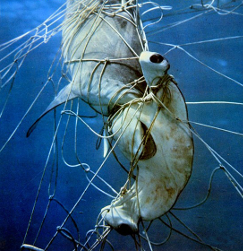Sea culling not limited to WA, other states have death policies too
 Authorities say that as the furore over Western Australia’s shark-culling policy continues, it is worth remembering that other states continue to run similar regimes killing local marine predators.
Authorities say that as the furore over Western Australia’s shark-culling policy continues, it is worth remembering that other states continue to run similar regimes killing local marine predators.
Dr Andrew Warren from the University of New England’s School of Behavioural, Cognitive and Social Sciences says politics has trumped science and even common sense, allowing NSW & Queensland to trap and kill stingrays, turtles and small sharks under the banner of ‘public protection’.
He says in 2012-2013 at least 73 sharks, rays and turtles died after being caught in nets as part of the NSW Government’s ‘meshing’ program. Of the sharks that perished, only a small number were of species considered to be potentially dangerous to humans.
In Queensland it is blanket policy to ‘euthanise’ any shark captured over two metres long, if it is not already dead.
Reports say 1370 captured sharks perished or were slaughtered in Queensland’s 2012-2013 control program; 1103 – regardless of size, type or ‘danger factor’ – were found already dead in nets or on baited hooks, and 267 were shot dead. Only 69 were released alive.
“The methods used by Australian governments to reduce shark attacks on sea users are not only scientifically unproven, but also put at risk the populations of our marine creatures, some of which are officially listed as endangered, vulnerable or threatened on the ‘Red List’ of the International Union for Conservation of Nature (IUCN),” Dr Warren said.
“On top of this, Australia is at risk of losing international environmental credibility. On the one hand we’re leading action against Japanese whaling in the International Court of Justice, and on the other hand we are killing protected endangered marine species. It is hypocritical.”
Dr Warren is a lifelong surfer who understands the dangers of entering the native habitat of any dangerous predator.
“Any death by shark attack is absolutely tragic for the victim’s family, friends and wider community, and while protection measures are undertaken with the best intentions, culling or trapping sharks is not scientifically proven to work and has significant implications for other marine species,” he said.
“We just don’t know what longer-term impact these measures may have on vulnerable shark populations and fragile marine ecosystems.”








 Print
Print